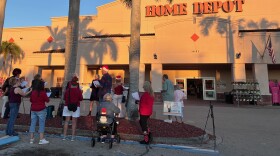Last fall President Trump halted U.S. commercial flights to all Cuban cities except Havana. On Friday he did the same for U.S. charter flights. But the political risks for Trump could outweigh the benefits he sees here in Florida.
When President Trump cut all U.S. commercial flights to Cuba except those to Havana, Cuba experts doubted its economic effect on the regime.
Most U.S. visitors to Cuba fly directly to Havana anyway. The folks who fly to Cuba’s other cities are most often Cuban-Americans visiting family. They could still fly direct to those cities on charter flights.
Now Trump is eliminating charter flights to Cuba’s interior cities. Secretary of State Mike Pompeo tweeted the action will “[prevent] the Castro regime from using [that] revenue to repress the Cuban people.”
That will be popular with more hardline Cuban exiles who want to isolate Cuba again – and who voted for Trump in 2016 in significant numbers. The question is whether it will galvanize more moderate Cuban-Americans to vote against him.
That’s because going through Havana to visit family in Cuba can be hard: Flights from Havana to other cities are erratic and expensive; and trips by bus or car on Cuba’s roads can be long and arduous.
Trump’s predecessor, Barack Obama, won Florida in part by making it easier for Cuban-Americans to engage relatives in Cuba. Trump apparently thinks he’ll win Florida again by making it tougher.
Copyright 2020 WLRN 91.3 FM. To see more, visit WLRN 91.3 FM. 9(MDAyMTYyMTU5MDEyOTc4NzE4ODNmYWEwYQ004))








